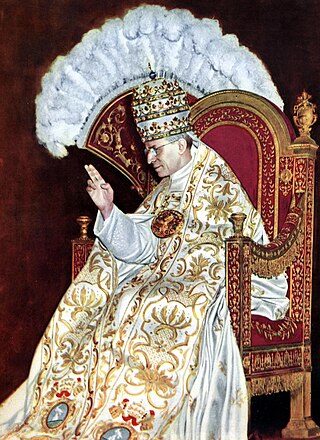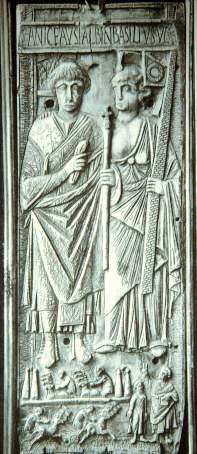Related Research Articles

Pope Symmachus was the bishop of Rome from 22 November 498 to his death. His tenure was marked by a serious schism over who was elected pope by a majority of the Roman clergy.
Pope Hormisdas was the bishop of Rome from 20 July 514 to his death. His papacy was dominated by the Acacian schism, started in 484 by Acacius of Constantinople's efforts to placate the Monophysites. His efforts to resolve this schism were successful, and on 28 March 519, the reunion between Constantinople and Rome was ratified in the cathedral of Constantinople before a large crowd.

The sedia gestatoria or gestatorial chair is a ceremonial throne on which popes were carried on shoulders until 1978, which was later replaced outdoors in part with the popemobile. It consists of a richly adorned, silk-covered armchair, fastened on a suppedaneum, on each side of which are two gilded rings; through these rings pass the long rods with which twelve footmen (palafrenieri), in red uniforms, carry the throne on their shoulders. On prior occasions, as in the case of Pope Stephen III, popes were carried on the shoulders of men.
Magnus Felix Ennodius was Bishop of Pavia in 514, and a Latin rhetorician and poet.
Laurentius was the Archpriest of Santa Prassede and later antipope of the See of Rome. Elected in 498 at the Basilica Saint Mariae with the support of a dissenting faction with Byzantine sympathies, who were supported by Eastern Roman Emperor Anastasius I Dicorus, in opposition to Pope Symmachus, the division between the two opposing factions split not only the church, but the Senate and the people of Rome. However, Laurentius remained in Rome as pope until 506.
Messala or Messalla may refer to:

Anicius Faustus Albinus Basilius was a high official of the Eastern Roman Empire and the last ordinary consul of Roman history, holding the office alone in 541.

Flavius Felix, sometimes erroneously called Constantius Felix, was a general of the Western Roman Empire, who reached the prominent rank of patrician before being killed probably by order of Aetius. For his consulate, in 428, he issued some consular diptychs, one of which has been preserved until modern times.

The praetorian prefecture of Italy was one of four praetorian prefectures into which the Late Roman Empire was divided. It comprised the Italian peninsula, the Western Balkans, the Danubian provinces and parts of North Africa. The Prefecture's seat moved from Rome to Milan and finally, Ravenna.
Magnus was a Roman senator of Narbonne. He was appointed Roman consul in 460 by the Western emperor Majorian, at the same time Apollonius served in the East. Magnus also served as praetorian prefect of Gaul around the same time.

FlaviusAreobindus Dagalaifus Areobindus was an Eastern Roman general and politician. The scion of a distinguished line, he led troops in the Anastasian War, and served as consul in 506. During an urban riot in 512, Areobindus evaded a mob which wanted to force a change of government by proclaiming him emperor. He died soon after.
Lucius Valerius Messalla Volesus was a Roman senator, who flourished under the reign of Emperor Augustus. He was consul in AD 5 with Gnaeus Cornelius Cinna Magnus as his colleague. His father, Potitus Valerius Messala, was suffect consul in 28 BC and prefect of the city of Rome.
Gennadius Avienus was an influential politician of the Western Roman Empire. He was consul in 450, alongside Valentinian III. In 452, he was an envoy to Attila; together with Pope Leo I and Trigetius he successfully negotiated a truce. He had a son and a daughter; his son would go on to be consul in 490.
Anicius Acilius AginantiusFaustus, also known as Faustus albus ("white"), was a Roman politician under Odoacer's rule. His brothers included Rufius Achilius Maecius Placidus, and Rufius Achilius Sividius.
Flavius Avienus was a Roman politician during the reign of Theodoric the Great. He held the consulship with Pompeius as colleague in 501.
Venantius Opilio was a Roman politician during the reign of Theodoric the Great. Although he was consul as the junior colleague of emperor Justin I in 524, Opilio is best known as one of the three men whom Boethius claimed in his De consolatione philosophiae provided evidence of his treason against king Theodoric, an act which led to Boethius' imprisonment and death.
Flavius Agapitus was a Roman politician during the reign of Theodoric the Great. He held the consulship with Flavius Anastasius Paulus Probus Sabinianus Pompeius Anastasius as his colleague in 517.
Rufius Magnus Faustus Avienus was a politician of the Western Roman Empire. He was appointed consul for 502 with Flavius Probus as his colleague.
Anicius Probus Faustus Niger was a politician of the Western Roman Empire who served as consul in 490 and as praetorian prefect of Italy from 509 to 512.
Ennodius may refer to:
References
- ↑ Roger S. Bagnall; Alan Cameron; Seth R. Schwartz & Klaas A. Worp (1987). Consuls of the Later Roman Empire. Oxford University Press. pp. 546–547. ISBN 1-55540-099-X.
- ↑ Jeffrey Richards, The Popes and the Papacy in the Early Middle Ages (London:Routledge and Kegan Paul, 1979), p. 79